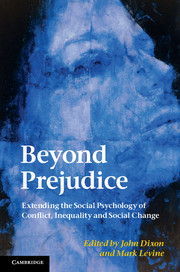Book contents
- Frontmatter
- Contents
- Figures
- Tables
- Contributors
- Acknowledgements
- Introduction
- Part I Beyond prejudice
- 1 From perception to mobilization: the shifting paradigm of prejudice
- 2 Prejudice, social identity and social change: resolving the Allportian problematic
- 3 An ambivalent alliance: hostile and benevolent sexism as complementary justifications for gender inequality
- 4 Prejudice and dehumanization
- 5 Stereotyping, prejudice and discrimination revisited
- 6 Beyond ‘old’ and ‘new’: for a social psychology of racism
- 7 The notion of ‘prejudice’: some rhetorical and ideological aspects
- 8 The prejudice problematic
- 9 Implicit prejudice in mind and interaction
- 10 Rethinking the prejudice problematic: a collaborative cognition approach
- Part II Prejudice and social change revisited
- Index
- References
7 - The notion of ‘prejudice’: some rhetorical and ideological aspects
from Part I - Beyond prejudice
Published online by Cambridge University Press: 05 June 2012
- Frontmatter
- Contents
- Figures
- Tables
- Contributors
- Acknowledgements
- Introduction
- Part I Beyond prejudice
- 1 From perception to mobilization: the shifting paradigm of prejudice
- 2 Prejudice, social identity and social change: resolving the Allportian problematic
- 3 An ambivalent alliance: hostile and benevolent sexism as complementary justifications for gender inequality
- 4 Prejudice and dehumanization
- 5 Stereotyping, prejudice and discrimination revisited
- 6 Beyond ‘old’ and ‘new’: for a social psychology of racism
- 7 The notion of ‘prejudice’: some rhetorical and ideological aspects
- 8 The prejudice problematic
- 9 Implicit prejudice in mind and interaction
- 10 Rethinking the prejudice problematic: a collaborative cognition approach
- Part II Prejudice and social change revisited
- Index
- References
Summary
Introduction
A recent issue of a magazine published by the National Front contained an article entitled ‘Patterns of prejudice’. It began with the statement: ‘Perhaps the favourite accusation thrown at the National Front by its multi-racialist critics is that we are simply a bunch of bigots, that our stance on Race, the very heart and core of our political being, is no more than ignorant prejudice against Coloured people’ (Vanguard, April 1987). The tone of the article was pseudo-academic. The author, in the style of a scholar, defines ‘prejudice’ in his second paragraph: ‘it is generally taken to mean forming an opinion, especially about an issue or person or group of people, without knowing, or without taking into account, all the relevant facts’. The main part of the article was devoted to arguing that the National Front had taken into account ‘the relevant facts’ in coming to its conclusions that Britain should be populated solely with white-skinned people. The author cited psychological books, which claimed that black people were intellectually inferior on average to white people: ‘Read The Inequity of Man by H. J. Eysenck, Professor of Psychology at the University of London for the facts here.’ A couple of paragraphs of lay anthropology were added to suggest that black people in Africa had accomplished ‘virtually nothing’ before ‘the White Man came’. The references to professors and their books led to the predictable conclusion: ‘On the Black issue our verdict is based on the facts, we have judged the case on the evidence, fairly, and come to the only just conclusions.’ It was the National Front’s liberal opponents, who were avoiding the ‘facts’: ‘They can’t site [sic] a mass of scientific evidence to support their beliefs.’ Having defined the key term and having cited the relevant facts, the author’s final sentence points the accusing finger at liberals: ‘Dare we say it – it is they, not we, who are prejudiced.’
- Type
- Chapter
- Information
- Beyond PrejudiceExtending the Social Psychology of Conflict, Inequality and Social Change, pp. 139 - 157Publisher: Cambridge University PressPrint publication year: 2012
References
- 15
- Cited by



